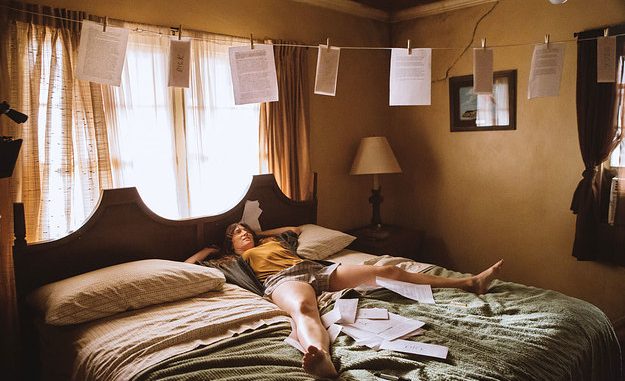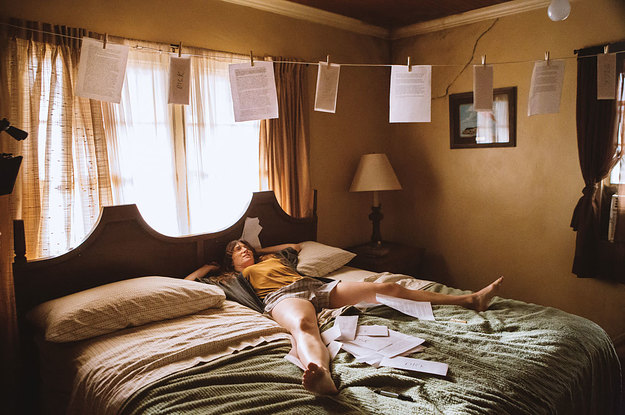

Amazon Prime Video
Kathryn Hahn in I Love Dick.
Jill Soloway’s I Love Dick feels like something beamed in from an alternate reality in which Hillary Clinton is president.
Which is probably a reflection of when it was made — the rollout of the series straddled the 2016 presidential election like a pair of proudly unshaven legs. The pilot premiered on Amazon, already home to Soloway’s acclaimed Transparent, in August of last year, and it was ordered to series in September, when the potential for the country to be getting its first female president seemed very real. But by the time the first season was unleashed online earlier this May, Donald Trump had been in the White House for months, and the mood has become very different.
I Love Dick, which creators Soloway and Sarah Gubbins adapted from Chris Kraus’s experimental novel of the same name, is a series out of time — a heady, horny comedy about gender and authorship arriving at a time in which people seem more inclined to relate to the dystopian oppressions of The Handmaid’s Tale. It’s a celebration of “weird girls,” to borrow the phrase from an episode title, who’ve grown into unquestionably ascendant adults.
Amazon Prime Video
Sylvere (Griffin Dunne) and Toby (India Menuez).
“We are not far from your doorstep,” the ambitious Toby (India Menuez) — who received a Guggenheim for her work “look[ing] at hardcore porn without judgment, so I reduce it to its shapes” — cautions the title character (Kevin Bacon). Dick is a rugged area art star, a renowned sculptor of minimalist works that Toby sums up as “everything anyone has ever wanted from a late-20th-century alpha-male artist and scholar.” She doesn’t need to point out how many years removed we now are from the 20th century.
The whole series, which is fueled by the all-consuming crush that married filmmaker-in-crisis Chris (Kathryn Hahn) develops on Dick and starts chronicling in a series of letters, is built on the certainty of the gradual toppling of patriarchy. That’s something that not only comes across as unhappily premature in the shadow of Trump and Mike Pence, it also plays as downright wistful. Which is why, maybe, I Love Dick ends up being comforting even though it aims to be challenging.
The episodes, almost all of them directed by women (among them Andrea Arnold and Soloway herself), spike clips of video art into scenes and splash intertitles from Chris’s letters on screen. The best installment is a nonlinear one in which four of the female characters take the viewer on a tour of their formative experiences with desire while staring down the camera. But all of that formal and thematic boundary-busting takes place under the unspoken assumption that a degree of space and safety have been secured for its characters to hash out the intricacies of their feelings about being the subject of art versus being its creator, about what constitutes good and important art, and about who gets to play gatekeeper in that.
Amazon Prime Video
Devon (Roberta Colindrez) leads a rehearsal.
At a moment when subjects like masculinity, femininity, and authority all but demand a hard edge and shriek of urgency, I Love Dick is forthright but ultimately gentle in the way it takes them on — like it can afford to be, like a major milestone has been passed, like forward progress, however slow and imperfect, is an inevitability. It is the strangest sort of escapist television.
That’s true of the way it treats the art world it inhabits, too, one that’s allowed to be silly but that is taken very seriously. Its artists can be pretentious, self-important, flaky, and awful, but there’s never any question of whether art itself has value and relevance. Art can change the world in I Love Dick, even if that world is restricted to the bubble of Marfa, Texas, a bohemian oasis with complicated class dynamics. Or, in the words of Sylvere (Griffin Dunne), Chris’s writer husband whose research fellowship at the local art center is the reason they’re in town, a place “both dumpy and hip.”
It’s a place that, at the series’ start, is in the thrall of Dick, the professor-prince who quickly becomes the focus of Chris’s all-consuming obsession. But it doesn’t stay that way, thanks in part to how Chris, who’s “straddling 40ish” and questioning her career and romantic choices, ends up unleashing her debilitating-crush-as-midlife-crisis on the community and unsettling its power structures.
Jessica Brooks/Amazon Prime Video
Hahn as Chris.
By the season’s end, men are joyfully submitting themselves to being the stuff of genderqueer artist’s Devon (Roberta Colindrez) work, in front of a cheering, hooting female crowd, while gallery curator Paula (Lily Mojekwu), finally free to choose the art she wants, ecstatically takes down paintings and slaps aspirational Post-its in their place that read “Kara Walker” and “Laura Aguilar.” I Love Dick is generous with its male characters in the way that feels directly related to its conviction that the supremacy they have — apologetically, obliviously, or gladly — enjoyed is slipping from their hands. It takes place in the twilight of machismo.
Or maybe it’s better put as the liberation of machismo, since we see it wielded just as comfortably by Devon, who admired Dick’s cowboy swagger, then borrowed and adapted and embraced it. Chris appropriates and lays claim to something traditionally male, too: the idea of a muse. “There are 500 times as many female nudes in art history textbooks as there are female artists,” Toby observes at one point. Chris seems intent on making up ground and turning that ratio around. She utilizes Dick — that Marlboro Man of MFAs, with a penis for a name, with his sculpture that’s a literal brick (“I love a straight line,” he says, “a straight line is perfection”) — as not only an object of desire but also a source of inspiration. He fuels the outpouring of love letters, profane and profound in their rawness, that she ends up posting around town.
Amazon Prime Video
I Love Dick
Chris’s lust is not just symbolic — it’s very genuine, and I Love Dick has gotten attention for the way it translates that giddy lechery in its gaze, the ways its lens glides along the planes of Bacon’s face and body like it has nerves and they’re all lit up, for its incredible fantasy of Bacon sensually shearing a lamb. But Chris’s lust can’t be separated out from the feverish creative spell with which she’s gripped — the writing she’s doing is both addressed to Dick (“Dear Dick: Game on”) and not about him at all. Her desire and how it makes her feel is an end unto itself — “I don’t care how you see me. I don’t care if you want me. It’s better that you don’t. It’s enough that I want you,” she writes.
He’s distressed and undone to find himself placed so unwittingly in her spotlight. “She has violated my privacy!” he yelps at one point, a strange sort of protest, since Chris knows nothing at all about him, and since her work is all about how she feels and what she knows she’s projecting on him. Though Dick, grudging, agrees the writing’s good, he adds, “So what? It’s still fucked up.”
Maybe it is, and maybe what’s most disturbing to Dick is how little agency in or ownership he has over this art that invokes him while belonging to someone else — the muse’s lament. But Chris writes because she’s driven to create, not because she wanted to humiliate him, despite their first encounters. It’s the moment Dick first looked at her, rather than the other way around, in which her life went off the rails, when everything temporarily went quiet in the embrace of his ever-so-valued attention.
Then at dinner, later, Dick dismissed Chris’s work without ever having seen it. Not just her work, but that of her entire gender. “I think it’s really pretty rare for a woman to make a good film because they have to work from behind their oppression, which makes for some bummer movies,” he drawls, daring her to get angry, leaving her spitting names (Jane Campion! Chantal Akerman!) in her own flustered defense, trying not to let him see how badly he’s skewered her current insecurities.
Patrick Wymore/Amazon Prime Video
Dick (Bacon), Sylvere (Dunne), and Chris (Hahn) at dinner.
From then on, Chris is consumed, wanting to fuck and to fight Dick, to gain his approval and to devour him whole. But in the end, she gets the best revenge by not thinking about revenge at all. Instead, she makes something real and good and marked by a whole other sort of authenticity than the kind Dick signals with his hand-rolled cigarettes and his refusal to explain his art. When looked at from the heart of 2017, that may be the show’s most plaintive aspiration of them all, the part that’s most out of sync with the sometimes merited and sometimes pandering go-girl defiance that has marked other recent series with overtly feminist bents, your Jessica Joneses and Girlbosses.
Chris’s desire to prove herself to Dick shifts to the understanding that, actually, she doesn’t need to, that she doesn’t require his validation or a spot in his prestigious, sparsely attended gallery — that rather than battling him to be seen, she pins her letters to public walls. She makes a sort of peace with Dick, allowing him to emerge from object to flesh-and-blood person who’s acutely aware that his moment is over — in some ways, it’s her biggest power move of all. But it’s a microcosmic shift dependent on the idea that the larger world has changed, which is why I Love Dick‘s freaky, free-dancing looseness has ended up unintentionally shot through with sadness. The world can change, but as everyone’s been reminded, it’s also capable of changing back.

